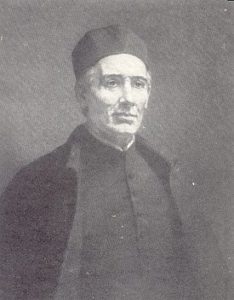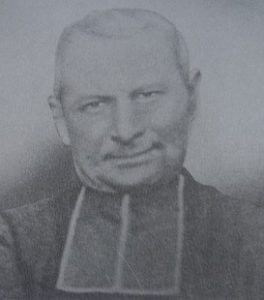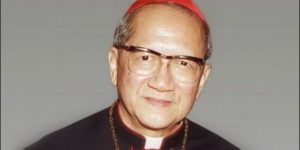The Cor Unum Family, to which the Society for the Evangelical Life of the Heart of Jesus (SVECJ) belongs, claims to be inspired by the spirituality of Ignatius of Loyola. He is, in a way, the first of our founders alongside Pierre de Clorivière, Daniel Fontaine and François-Xavier Nguyên Van Thuân.
Ignatius of Loyola
 This Basque was born in 1491 into a family of minor nobility. In 1521, a cannonball broke his leg during a battle against the French. Following a long convalescence, he read the life of Christ and the biographies of saints. These readings led him to a personal experience of God. The Spiritual Exercises were born out of this journey. While studying in Paris, he met his first companions with whom he founded the Society of Jesus.
This Basque was born in 1491 into a family of minor nobility. In 1521, a cannonball broke his leg during a battle against the French. Following a long convalescence, he read the life of Christ and the biographies of saints. These readings led him to a personal experience of God. The Spiritual Exercises were born out of this journey. While studying in Paris, he met his first companions with whom he founded the Society of Jesus.
The experience of Ignatius and his first companions is based on a personal relationship with Christ to find God in everything. Read more
Pierre-Joseph Picot de Clorivière
 Among our founders, this Breton born in 1735, holds a special place. He was the renovator of the Society of Jesus in France. The Pope suppressed it in 1773. This had a profound effect on P. de Clorivière. In 1790, in the chapel of La Fosse-Hingant, near Saint-Malo, he was inspired to to create a new form of consecrated life. This is a new form of consecrated lifeinspired by the Constitutions of the Society of Jesus. Its members live fully immersed in the modern world without any distinctive sign.
Among our founders, this Breton born in 1735, holds a special place. He was the renovator of the Society of Jesus in France. The Pope suppressed it in 1773. This had a profound effect on P. de Clorivière. In 1790, in the chapel of La Fosse-Hingant, near Saint-Malo, he was inspired to to create a new form of consecrated life. This is a new form of consecrated lifeinspired by the Constitutions of the Society of Jesus. Its members live fully immersed in the modern world without any distinctive sign.
Institutes
Two institutes were thus created: the Priests of the Heart of Jesus – from which the SVE emerged – and the other, the Daughters of the Heart of Mary, a feminine institute. He founded the latter with the help of Adélaïde de Cicé. Their first members took their vows in February 1791. Some of them in the Martyrium of Montmartre, others in Saint-Malo. In 1866, its last member died and with him the Institute. It was not until 1918 that a priest from Paris, Daniel Fontaine, refounded the Priests of the Heart of Jesus.
I conceived that it was a question of establishing a universal religious Society which would be open to all kinds of people, of all ages, of all countries, of all conditions, who would be capable of evangelical perfection… Neither the one nor the other would separate its members from the common people of the faithful (letter of 6 April 1810)
In 1805, he asked to be affiliated to the Russian Jesuits. In 1814, the Pope re-established the Society. His superior general asked Pierre de Clorivière to gather the 80 Jesuits still present in France and appointed him superior and novice master. In 1818, he left his position at his own request. He died on 9 January 1920.
Daniel Fontaine
 Born in 1862, he entered the Congregation of the Brothers of Saint Vincent de Paul at the age of 20. He chose this order in order to become a priest and to take care of young people. In 1895, he became director of the Orphans of Auteuil. In September 1902, his request to be released from his religious vows was granted by Cardinal Richard. He then appointed him to Clichy.
Born in 1862, he entered the Congregation of the Brothers of Saint Vincent de Paul at the age of 20. He chose this order in order to become a priest and to take care of young people. In 1895, he became director of the Orphans of Auteuil. In September 1902, his request to be released from his religious vows was granted by Cardinal Richard. He then appointed him to Clichy.
Clichy
The parish of Saint-Vincent-de-Paul in Clichy was in full expansion at the time. The eastern part of the parish was an area of ragpickers where priests hardly penetrated… The chapel dedicated to Notre-Dame Auxiliatrice was entrusted to Daniel Fontaine. In 1907, it became a parish and he was the first parish priest. In addition to the social works he founded: evening classes, workshops, free medical consultations, a job placement office, Father Fontaine encouraged the creation of a local women’s session of the CFTC.
Paris
In October 1915 he left Clichy. He took over the pastoral care of Saint-Antoine-des-Quinze-Vingt in the 12th arrondissement of Paris. It was during this period that he realised his dream of a community of diocesan priests with religious vows. He relaunched the Society of Priests of the Heart of Jesus. In this way, he was inspired by Pierre de Clorivière. Consequently, he is one of the founders of the SVECJ – Cor Unum Family.
François-Xavier Cardinal Nguyen Van Thuan
 This clergyman is the fourth founder of the SVECJ – Cor Unum Family. François Xavier Nguyên Van Thuân, was born on April 17, 1928 in Vietnam, in Phu Cam in the archdiocese of Hué. He was ordained a priest on 11 June 1953. The priests of the Heart of Jesus were a real inspiration for him. As a result, he created the Hope Groups in Vietnam, which became part of the Cor Unum Family.
This clergyman is the fourth founder of the SVECJ – Cor Unum Family. François Xavier Nguyên Van Thuân, was born on April 17, 1928 in Vietnam, in Phu Cam in the archdiocese of Hué. He was ordained a priest on 11 June 1953. The priests of the Heart of Jesus were a real inspiration for him. As a result, he created the Hope Groups in Vietnam, which became part of the Cor Unum Family.
Prison
pope Paul VI appoints him coadjutor archbishop of the archdiocese of Saigon. The new communist power refused and summoned him on . He was then placed under house arrest and interned in the Phu Khanh prison. He was then imprisoned in Vinh Phu re-education camp in North Vietnam, then in Giang Xa house arrest, and finally in the Hanoi Security Department. His detention lasted more than thirteen years. Far from being free, he finally resided in the buildings of the Hanoi archdiocese where his material living conditions were nevertheless more comfortable.
Dear sons, I am in a new stage: difficult, obscure and endless. Here I also meet life’s passengers; I consider them friends, and all events as invaluable experiences. Because everything is grace. In my night filled with silence and solitude, I think of you all, of each one of you, and I offer you all to God
Rome
He went to the Vatican in 1991 and learned that the government did not want him to return. Pope John Paul II granted him asylum in the Vatican City State. On , he became president of the Pontifical Council for Justice and Peace. He preached the Roman Curia’s Lenten retreat in 2000 and was created a cardinal by the Pope the following year. He died on 16 September 2002.